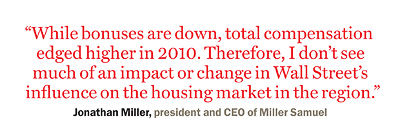
From left: Jonathan Miller, Gary Malin, Rena Goldstein and Kirk Henckels
A report released yesterday by New York State Comptroller Thomas DiNapoli showing that Wall Street cash bonuses declined by nearly 8 percent in 2010 will likely not put a damper on the residential real estate market, brokers said.
Wall Street paid an average cash bonus of $128,530, or a total of $20.8 billion, in 2010, about one-third less than the amount awarded in 2007 before the financial crisis, though it was the fifth-highest amount on record. The total amount of cash bonuses paid in 2009 was $22.5 billion. However, Wall Street profits in 2010 totaled $27.6 billion, the second highest year-to-date after 2009, when the industry benefited from federal bailouts and low interest rates.
“Cash bonuses are down, but that’s not an indicator of a weakness on Wall Street,” DiNapoli said. “Wall Street is changing its compensation practices in response to regulatory reforms adopted in the aftermath of the greatest financial meltdown since the Great Depression. Past practices rewarded short-term gains at the expense of long-term profitability.”
As for how this may affect the New York City real estate market, brokers were optimistic.
“Bonuses are always a good thing for us, and I haven’t heard or seen much of the effects this year that I had in previous years,” said Kirk Henckels, an executive vice president at Stribling & Associates.

Henckels noted that historically, the majority of his firm’s luxury market clientele has been comprised of Wall Street entrepreneurs, and that many of them tend to worry about the fluctuations in the market.
“There is still a lot of uncertainty on Wall Street and people are rather concerned about the last half of this year… so maybe they are restoring their liquidity and shoring up their balance sheets instead of spending so much,” Henckels said.
He also noted that there was talk about how the bonuses would be “more in the form of restricted stock, and money that was not readily available.”
Even though the bonuses aren’t great as a few years ago, “it is still the fifth-highest year on record for bonuses, so whatever happens has to be positive,” Henckels said.
Bonuses are “a key economic engine for the housing market,” said appraiser Jonathan Miller, president and CEO of Miller Samuel. But, they are not the only factor when it comes to making real estate moves.
“While bonuses are down, total compensation edged higher in 2010,” he said. “Therefore, I don’t see much of an impact or change in Wall Street’s influence on the housing market in the region.”
Meanwhile, Miller noted this year would be similar to last.
The information from the report indicates that 2011 “will be much like 2010, when activity levels rebounded and pricing stabilized, but only up to historic norms rather than some sort of boom,” he said.
Gary Malin, president of Citi Habitats, downplayed the overall role of bonuses as a key factor in a potential buyer’s decision.
“Those that are inclined to buy — because the market is indicating that it’s a good time to buy, with pricing and interest rates — are still going to buy,” he said. “There may be people that didn’t get the bonuses they thought they were going to, and they make take a ‘wait and see’ approach, but I don’t think the drop in bonuses was substantial enough to affect people’s desires to buy.”
Malin also emphasized that although a sizable percentage of the real estate purchases in New York City are made by Wall Streeters, they’re not the only ones.
“Those with money are still inclined to buy and we are seeing great demand,” Malin added.
One agent said her Wall Street clients have actually returned to the market.
“I am currently working again with Wall Street people who dropped out of the market and are now back in,” Rena Goldstein, a senior vice president at Halstead Property, said. “They are buying because they want to, not because they have to, so this is a change from the last few years.”